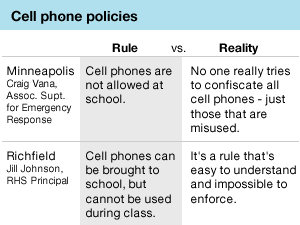Some schools look for ways to allow cell phones, without distractions
Go Deeper.
Create an account or log in to save stories.
Like this?
Thanks for liking this story! We have added it to a list of your favorite stories.

Richfield High School used to completely ban cell phones. But then some teachers started admitting to Principal Jill Johnson that they were just as guilty of sneaking a call during the day to their own kids.

Now, cell phones are allowed in Richfield schools, but you can't use them during class. Johnson says that gives students a chance to show responsibility.
"What seems like the easy thing to do is to just say 'no' to it. 'Put it away, I don't ever want to see those cell phones in school,' she said recently, while looking over her own two cell phones at her desk. "But the reality is they're such a fundamental in which we exist that not having them is so awkward it doesn't make sense, so we try to make a rule that's easy for us to understand but absolutely impossible for us to enforce."
Case in point: Jennifer Tuuri's first period at Richfield High - yearbook class. As Turri posted new grades for the young school year, students seemed to make little attempt to hide their phones. Maybe it's because yearbook is more relaxed than the usual lecture-style classes.
Turn Up Your Support
MPR News helps you turn down the noise and build shared understanding. Turn up your support for this public resource and keep trusted journalism accessible to all.
"I'm texting my friend who's supposed to be here to ask why she's not," said senior Sarah Flynn when asked by a reporter. Flynn adds if she were trying to text on the sly, she could easily.
"It's obvious to teachers, but [students] put binders up a little higher, they put their purse in a certain spot, they can text from the side, from the hip - there's a lot of different ways."

It also helps that Flynn and many students can text without looking at their phones.
For the most part, they text harmless messages, like about dating or hanging out. But teens also use their phones for legitimate reasons, like texting themselves reminders about homework.
The Minneapolis school district has a total cell phone ban, but the head of district safety, Craig Vana, says no one's really trying to confiscate all phones - just those that are misused.
For example, if a camera phones snaps photos in locker rooms or fights are taped with the intention of posting them online.
Vana also notes a special worry for schools with gangs: "Let's say they have a problem with someone at school, they get on their cell phone, they call their compatriots, and they all run up to the building.

"Now you have a fight on your hands."
But despite that, Vana says the biggest supporter of cell phones is parents wishing to keep in touch.
Concerns, though, aren't just over safety. Teachers now have to look for students texting answers to tests across the room. And overall, they wonder how a texting student could possibly pay attention.
It's a topic a group of six South and Southwest High Schoolers recently discussed over pizza in Minneapolis. One teen admitted to cheating by phone; another said fights are always recorded, and sophomores Emma Horner, Sarah Krall, and Max Gerbner talked about the distraction.
"I think it's definitely a distraction but I'm still going to do it," noted Horner. Krall joined in, saying "it's more interesting than school." "If we weren't distracted that way," Gerbner pointed out, "we'd find some other way."
Still, the teens don't criticize the rule, they just call it unenforceable. And it's that sentiment that has many schools tweaking their policies - not in defeat, but to better align with reality.
Parents and students in the Stillwater district can now get texts when there's a snow day.
The rule in Cannon Falls is 'keep it out of sight' -- but that could soon change to require all phones be placed on desks with ringers off, so teachers can verify that students aren't using them.
Students in Fergus Falls can use phones between classes but not during them, and parents of first-time violators must sign a form in which they, the parents, acknowledge the policy.
"Sometimes parents want the school to be the bad guy," said assistant principal Greg Winter. 'Well, I told you not to bring that cell phone to school, now look what happened,' instead of joining in with us and helping us teach them - and for the most part, the rest of us - the proper way to use cell phones."
Fergus Falls students caught misusing a phone twice used to lose the phone for the school year, but that was recently changed just two weeks. Winter says that's because the year-long ban was useless - parents who wanted to keep in touch just kept replacing confiscated phones with new ones.
Dear reader,
Political debates with family or friends can get heated. But what if there was a way to handle them better?
You can learn how to have civil political conversations with our new e-book!
Download our free e-book, Talking Sense: Have Hard Political Conversations, Better, and learn how to talk without the tension.




